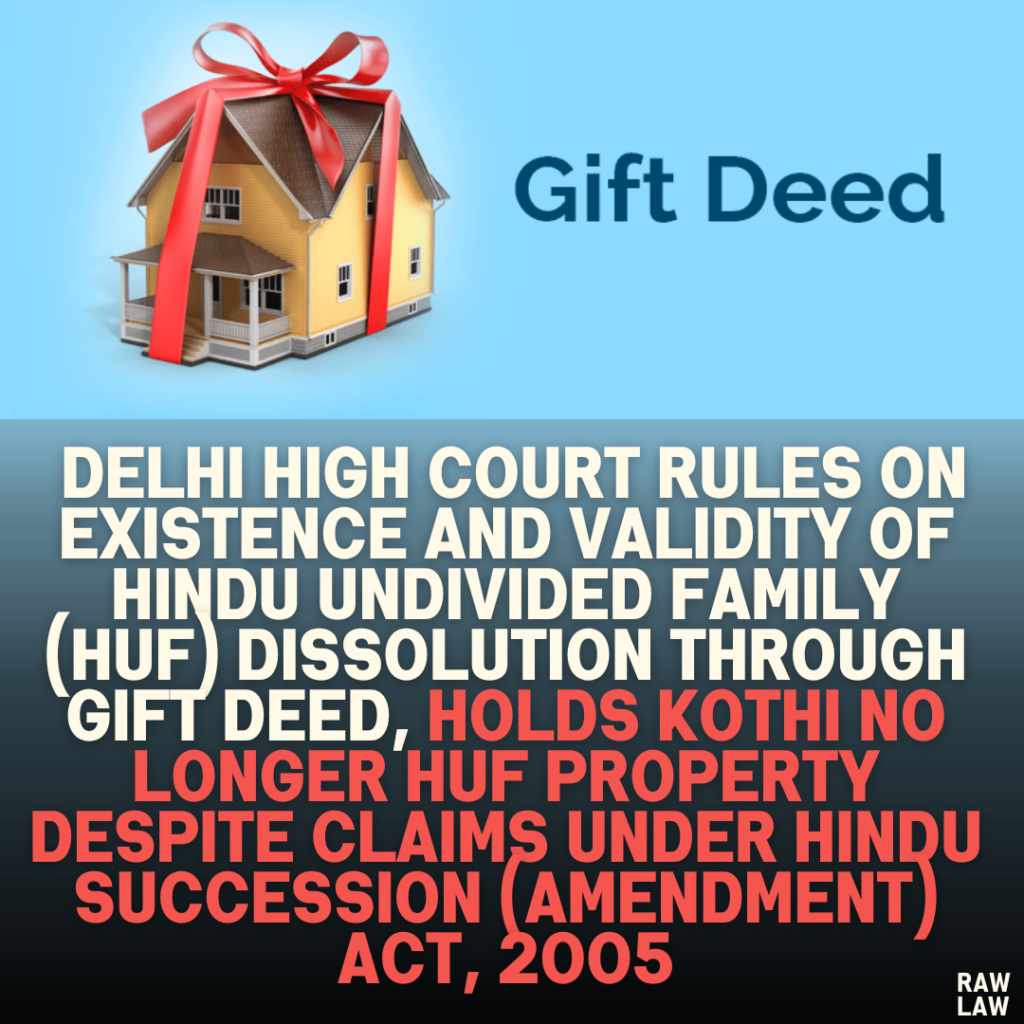Court’s Decision:
The Delhi High Court ruled that the property in question, a house at A-28 Friends Colony East, New Delhi (the “Kothi”), was part of the Ram Das HUF and had acquired the character of joint family property when it was placed into the HUF’s common hotchpotch in 1978. However, the court held that the HUF ceased to exist upon the execution of a valid registered Gift Deed dated 24.08.2004, where defendant No. 2 (Ram Das) partitioned the Kothi between his two sons, defendant Nos. 3 and 4, by metes and bounds, converting the property into individual ownership. Accordingly, the plaintiff’s claims for partition and declaration of rights in the HUF properties were dismissed.
Facts:
- Formation of HUF: Defendant No. 2, Ram Das, allegedly created the Ram Das HUF in 1978 by placing his self-acquired property, the Kothi, into the HUF for the family’s benefit. Defendant No. 2 was the Karta (manager) of the HUF, which also included his second wife, Smt. Shanti Devi, and his two sons (defendant Nos. 3 and 4) as coparceners.
- Plaintiff’s Claims: The plaintiff, a daughter of defendant No. 2 from his first wife, claimed to have a 1/5th share in the HUF properties under the Hindu Succession (Amendment) Act, 2005, which granted daughters equal coparcenary rights. She argued that the Kothi, along with other properties and financial assets, constituted HUF property.
- Gift Deed of 2004: In 2004, defendant No. 2 executed a Gift Deed, gifting specific portions of the Kothi to his two sons, defendant Nos. 3 and 4. The Gift Deed demarcated the property into two separate portions and was registered with the Sub-Registrar.
- Defendants’ Argument: The defendants contended that the HUF was created solely for tax-saving purposes, that the Kothi was never part of any ancestral nucleus, and that the HUF dissolved when the Gift Deed was executed in 2004, making defendant Nos. 3 and 4 the exclusive owners of their respective portions.
Issues:
- Whether the Ram Das HUF existed at the time of the Hindu Succession (Amendment) Act, 2005.
- Whether the Kothi and other assets constituted HUF property.
- Whether the plaintiff, married to a Muslim under the Special Marriage Act, had forfeited her rights under the Hindu Succession Act.
- Whether the Gift Deed of 2004 and the wills executed by defendant No. 2 and his second wife had validly dissolved the HUF.
Petitioner’s Arguments:
- The plaintiff argued that the HUF existed as of 2005 and that its properties included the Kothi, bank accounts, PPF accounts, and other movable and immovable assets.
- The plaintiff claimed that the Gift Deed of 2004 was void, as defendant No. 2 could not gift HUF property in his individual capacity.
- She relied on income tax records and defendant No. 2’s will from 1987 to demonstrate that the Kothi was treated as HUF property.
Respondent’s Arguments:
- The defendants argued that the HUF was a tax-saving arrangement and lacked an ancestral nucleus, as the Kothi was the self-acquired property of defendant No. 2.
- They contended that the Gift Deed of 2004 partitioned the property, dissolving the HUF, and was validly executed with the consent of the coparceners (defendant Nos. 3 and 4).
- The defendants also argued that the plaintiff forfeited her rights under Hindu law when she married a Muslim under the Special Marriage Act.
Analysis of the Law:
- Existence of the HUF:
- The court concluded that the HUF existed, relying on evidence such as the 1987 will of defendant No. 2 and income tax filings that treated the Kothi as HUF property.
- The court noted that self-acquired property could be converted into HUF property by clear intention and action, even in the absence of ancestral property.
- Effect of the Gift Deed:
- The court held that the execution of the Gift Deed in 2004 validly partitioned the Kothi by metes and bounds. Defendant No. 2, acting as Karta, gifted specific portions of the property to his sons with their consent, converting the joint family property into individual ownership.
- The court emphasized that partition through a Gift Deed is legally permissible if all coparceners consent.
- Precedents Cited:
- Captain Bhupinder Singh Suri v. Naresh Kumar Suri: Affirmed that self-acquired property can be converted into HUF property through explicit intention.
- V.N. Sarin v. Major Ajit Kumar Poplai: Explained that partition transforms joint family property into individually owned property.
- Thamma Venkata Subbamma v. Thamma Rattamma: Stressed that coparcenary property can only be gifted with coparcener consent.
Court’s Reasoning:
- The court found that the Kothi was made part of the HUF when defendant No. 2 placed it in the common hotchpotch in 1978. However, the Kothi ceased to be HUF property upon its partition through the Gift Deed in 2004.
- The court rejected the plaintiff’s argument that the Gift Deed was invalid, noting that defendant No. 2 had the authority to gift the property as Karta with the consent of coparceners.
- The court also dismissed the plaintiff’s claim that the HUF continued to exist, stating that the division of the Kothi into specific portions dissolved the HUF.
Conclusion:
The court dismissed the plaintiff’s claims for partition and declaration, holding that:
- The Ram Das HUF ceased to exist on 24.08.2004 with the execution of the Gift Deed.
- The Kothi was no longer HUF property as of that date, and no HUF property existed for partition when the Hindu Succession (Amendment) Act, 2005 came into effect.
Implications:
- The judgment underscores the principle that self-acquired property can be converted into HUF property but can also lose its HUF character through valid partition or transfer.
- It clarifies that a daughter’s rights under the Hindu Succession Act depend on the existence of HUF property as of 2005, and such rights do not revive after the dissolution of an HUF.



